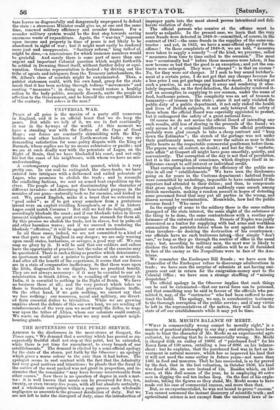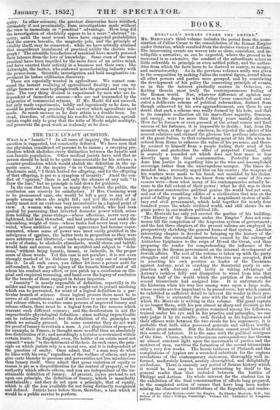MR. MECHPS BALANCE OF MERIT.
"WHAT is commercially wrong cannot be morally right," is a maxim of practical philosophy in our day ; and attempts have been made to blast the character of Mr. Mechi as an experimental agri- culturist, by showing that he is commercially wrong. Mr. Mechi is charged with an outlay of 16001. of "purchased food" for his Essex farm of 150 acres, entailing a loss of 600/. on his balance- sheet : but he explains, that the purchased food was in fact an in- vestment in natural manure, which has so improved his land that it will not need the same outlay in future years—not more than 1501. in food and manures. That he has succeeded, is so far proved by the fact, that in the last valuation, in October 1850, his land was fixed at 36s. an acre instead of 12s. Besides which, on 150 acres, at this dull season of the year, he is employing 40 extra men in digging the soil ten inches deep. On the face of his expla- nations, taking the figures as they stand, Mr. Mechi seems to have made out his case of commercial success, and more than that.
But, as an experimentalist, he was not bound to prove" success." You cannot command the instant discovery of scientific truth ; and agricultural science is not exempt from the universal laws of in-
quiry. In other sciences, the greatest discoveries have resulted, ultimately if not proximately, from investigations made without the view to immediate or "practical" advantage. How long did the investigation of electricity appear to be a mere " abstract" in- quiry, until the most recent times have suggested probabilities that the aurora borealis, the magnetic pole, and the principle of vitality itself, may be connected ; while we have actually attained that magnificent instalment of practical utility the electric tele- graph? The scientific benefactors of mankind have mostly pursued their labours from the love of knowledge. Some even of the most practical have been impelled by the mere force of an active mind, and have exerted their activity in a business not their own ; like Arkwright, the barber, who endowed manufacturing industry with the power-loom. Scientific investigation and bold imaginative ex- periment lie before utilitarian discovery. These are especially wanted in agriculture. We cannot com- mand the instant realizing of agricultural finality.; nor can we oblige farmers at once to plough truth into the ground and reap wel- fare. The very thing desired is experiment by men who are in- dependent of immediate success—who are not trammeled by the exigencies of commercial returns. If Mr. Mechi did not succeed, but only made experiments, boldly and ingeniously as he does, he would be performing precisely that service which agriculture most needs. So much success as he does attain is a double boon. In- stead, therefore, of criticizing his results by false canons, agricul- Wrists ought only to pray that the tribe of Mechi might multiply, and prosecute the good work as zealously as he does.



























 Previous page
Previous page